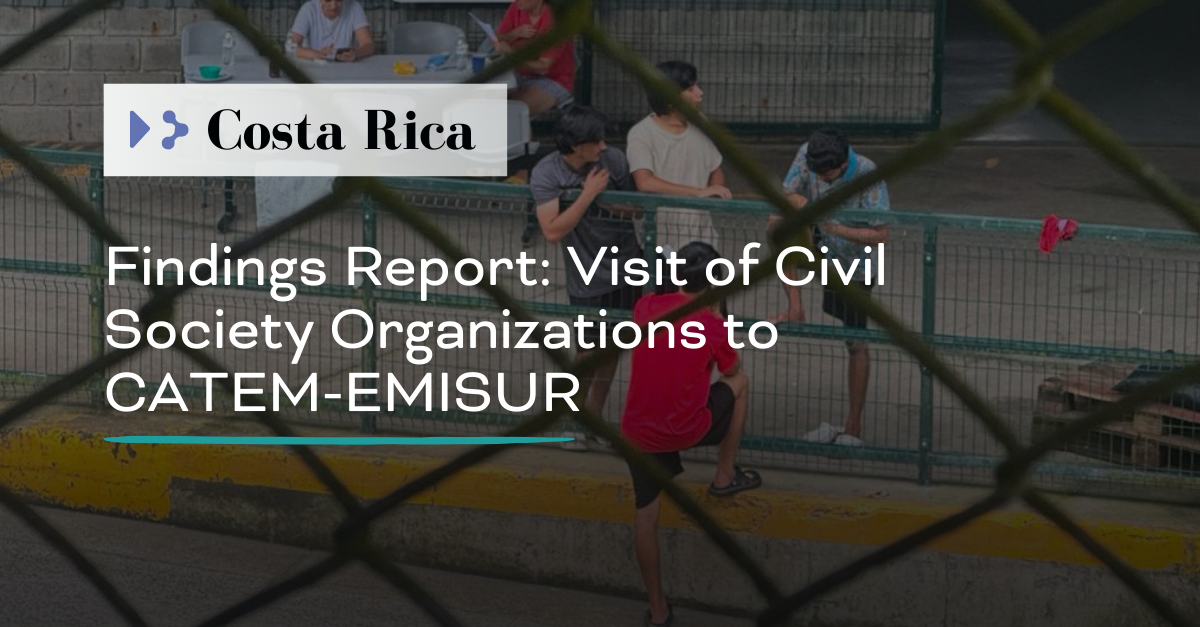






San José, May 8, 2025 – Human rights organizations denounce that the Costa Rican government participated in a series of human rights violations against migrants expelled by the U.S. government. By receiving these individuals—including children and adolescents—detaining them arbitrarily and illegally for more than 60 days, denying them adequate information, and failing to guarantee the principle of non-refoulement, the Costa Rican State violated their rights to health, physical and emotional integrity, and the right to pursue their life projects.
Additionally, the organizations argue that the measures taken by the Costa Rican State to end the detention—particularly the establishment of a temporary procedure for the regularization of migration status—are insufficient to remedy the harm committed against the migrants and to guarantee their access to rights and dignified, safe integration into the country.
These findings are documented in a report published today by the Center for Justice and International Law (CEJIL), the Jesuit Migrant Service Costa Rica (SJM-CR), and the American Friends Service Committee (AFSC), human rights organizations that conducted a monitoring visit on April 10 to the Temporary Attention Center for Migrants (CATEM-EMISUR) in Paso Canoas, on the border with Panama, where the individuals were being held, and that have provided legal assistance to several of these families during their stay in Costa Rica.
This visit was necessary as a consequence of the verbal agreement between the governments of the United States and Costa Rica, under which Costa Rica would serve as a reception and transit “bridge” for the collective expulsions of at least 200 people from the United States. At the time of the visit—the first time that civil society human rights organizations were allowed to enter CATEM to meet with deportees—94 individuals from Russia, Armenia, China, Nepal, India, the Republic of Congo, Yemen, Afghanistan, Uzbekistan, and other countries remained at the facility.
Findings: Dozens of people in limbo
The organizations provided information to 60 people and interviewed 24 regarding their removal from the United States, their arrival in Costa Rica, and their protection needs. Their findings include:
The report concludes that, more than two months after their arrival, most of those who remain in the country are unable to return to their countries of origin due to the risk of persecution or threats. However, they are also not interested in requesting asylum in Costa Rica. As one individual stated: “It is very difficult for us here in Costa Rica because we don’t know the language, the culture, the laws, nor do we have friends or family here.”
On April 21, the Costa Rican government issued a resolution authorizing “the migratory normalization of foreign persons deported from the United States of America (…) through the establishment of a special procedure.” Since then, individuals have been allowed to leave CATEM freely, and many have left the country—although the government has not followed up on their cases. Those who remain, however, are in limbo, unsure of what to do or how to rebuild their lives, the organizations report.
Need for a broad, comprehensive, and effective response
The organizations assertthat Costa Rica should not have accepted any agreement that exposes migrants to human rights violations and urge the State to avoid suchpractices in the future. They also point out that, as host country, Costa Rica has specific obligations toward this population that it must fulfill in accordance with its international human rights obligations.
In this regard, they acknowledge the creation of the special procedure for migratory regularization, but affirm that this measure does not guarantee the rights of those who remain in the country. In light of this, they offer a series of recommendations to the Costa Rican State, including:
The organizations call on the international community to offer protection to deported individuals who need it, and express their willingness to work with Costa Rican authorities in monitoring and implementation of these recommendations.
Help us continue this critical and urgent work with a donation!
DONATE NOW